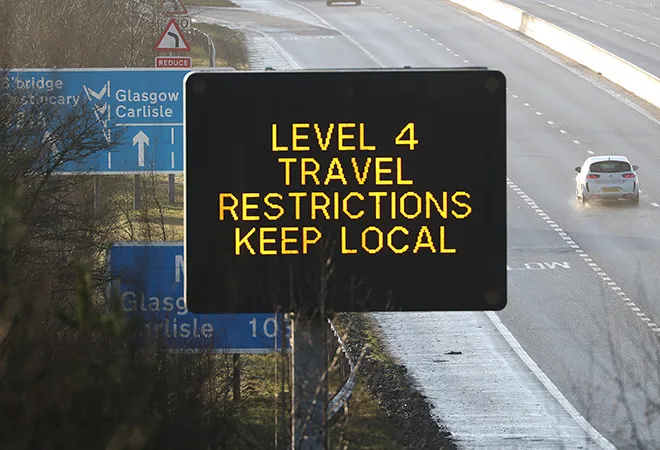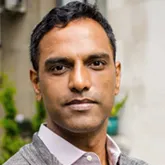
At a few minutes after 4:00 p.m. on Saturday, 19 December,
Prime Minister Boris Johnson announced that most of the South East of England, which includes London, and some other areas would be put under a new category of stringent restrictions called Tier 4. Up till then, Tier 3 was the most stringent category of restrictions to control the spread of COVID-19. This tier system was developed as a more nuanced alternative to a complete national lockdown. Cities and regions could be put into Tiers 1-3 relative to the situation and spread of infections in the area.
Johnson announced that alongside some areas being governed by new Tier 4 rules, other areas around the UK were being moved to higher tiers of restrictions.
Three aspects of the announcement on the 19
th were surprising and raised fears and ire of people both within and outside the United Kingdom. First, the 19
th press conference was unexpected, and it came soon after another
press briefing on 16 December. In that briefing, Johnson celebrated a week of vaccine deployment and delivery. And, in line with his usual rhetoric, Johnson stated, “We are winning, and we will win.” He then went on to explain social mixing rules for the Christmas holidays which were, in essence, a relaxation of the ongoing restrictions.
Three families of unlimited size could mix, or stay together in one house, for five days over the Christmas holiday period.
This tier system was developed as a more nuanced alternative to a complete national lockdown. Cities and regions could be put into Tiers 1-3 relative to the situation and spread of infections in the area.
Many people, including journalists at the press conference, questioned the logic of relaxing social distancing rules at a time when infections were rising across the country. The PM seemed to say that the three-family rule was a maximum, not a target. And that it would not be right or best for the people of the UK to cancel Christmas. But, in fact, that is exactly what he did a few days later on the 19
th. In areas
under the new Tier 4, a person cannot be outside one’s home or garden without a ‘reasonable excuse.’ And a person can socialise with only those who they live with, people in their ‘
support bubble,’ or one other person when both are outside in an open space. This meant people living in an area under Tier 4 could not travel outside their area, nor could they celebrate the holidays with anyone outside of their home.
Unsurprisingly, before the new rules would come into effect a few hours later at 12:01 AM on Sunday morning, thousands of people attempted to
leave London by road and trains. The sudden reversal of government policy from a few days earlier meant that hundreds of thousands if not millions of people (and different kinds of organisations and businesses) who had made plans for the holidays would have to cancel or change them. What Johnson had desperately tried to avoid — the anger of the British people against the government and him for curtailing their favourite holiday — could not be avoided. Some journalists have come to the conclusion that this reluctance to implement stringent policies until it is too late or reversing policies at the last minute is a pattern, perhaps indicative of a
certain kind of leaders in the UK. Journalists and others have also pointed out that the government and PM did not show hesitation enforcing restrictions during Id, Passover or Diwali. But that is a
different story.
What Johnson had desperately tried to avoid — the anger of the British people against the government and him for curtailing their favourite holiday — could not be avoided.
The second surprising aspect of the 19
th press conference was the justification provided for the new Tier 4 severe restrictions — that the rapidly increasing infections in South East England was due to
a new variant or mutation of the SARS-Co-V2 virus, named “VUI – 202012/01.” This new variant, clearly new to the world and emergent in the UK, was said to be more easily transmissible from person to person. It is not fully clear why it is more transmissible and whether this new variant is any more harmful than the known variants. But because more transmissions likely means more people will get COVID and die or suffer long term consequences, more severe restrictions through Tier 4 were implemented to curtail the rapidly rising spread of infections. Soon after the announcement, some European countries began to restrict flights from the UK, and the EU announced a meeting on Monday morning, the 21 December, to consider an EU-wide policy towards the new mutant virus in the UK. But beyond the biology of the new mutant virus, many things are unclear. For example, the UK government published on its website on 14 December that Public Health England was researching a new variant and had identified over 1,000 cases by 13 December. So why did the PM make it sound like he learned about it the day before his 19
th press briefing? Why did European countries wait till the briefing on the 19
th to ban UK flights? And then there is the strange way the UK is dealing with South Africa.
It is not fully clear why it is more transmissible and whether this new variant is any more harmful than the known variants.
Government officials in South Africa
announced publicly on 18 December that they had identified a new variant that was dominating new infections in the country. South African researchers had identified the new variant with a
genetic change weeks earlier, and had shared information with global colleagues around the world through the World Health Organisation’s COVID-19 Evolution Working Group. It was this news that apparently motivated UK researchers to interrogate their own genetic research on the virus more closely. But there was no mention of South Africa on the 19
th. Instead, on the 23
rd, at another press briefing,
Matt Hancock stated that another mutant virus was identified in South Africa, much more dangerous than the one in the UK and, therefore, all flights from South Africa would be cancelled. And visitors from South Africa or those in contact or recently in contact with South Africans needed to go into quarantine immediately. At a time when countries worldwide were barring travellers from the UK, the government’s decision to focus on a variant in South Africa, present it as being even more dangerous than the UK variant even though there is no clear evidence, and implementing travel restrictions seems odd, if not just more political theatrics.
The third surprising aspect of the
19th press briefing was that Johnson and colleagues explained that the country was yet again at another crucial point in the UK epidemic; infections were rising rapidly, deaths were increasing, and it was likely going to be as bad or worse than the initial wave of infections and deaths in the Spring. They said that these restrictions were necessary to prevent deaths and suffering but would not totally prevent a significant rise in deaths and suffering — a dark hard winter. The UK has suffered enormously over the past year. Most visibly, it has one of the highest rates of COVID deaths per million people, and has suffered the most economically among its peers. As the British people were processing their shock and anger in the days following the 19
th, the PM was back on television on the 23
rd. This time he spoke of how Christmas is a time of hope and rebirth. And, as a parting gift, he offered the British public a big stack of papers, stating that UK and EU had reached an agreement, a
Brexit deal.
If there is one thing that 2020 has taught all of us, it is that we should expect the unexpected.
No doubt, historians and those who write memoirs will provide more details of these past few weeks and of the final Brexit negotiations. This particular mutant virus will likely be yet another blip on the timeline of the transformation of the UK that began in January 2020. If there is one thing that 2020 has taught all of us, it is that we should expect the unexpected. An additional lesson might be that as we assess the unexpected, we need to learn how to separate what is happening in the world from what the politicians would like us to think is happening. Some might call it, learning to recognise truth. The mutant virus did not kill Christmas. It was a sequence of social and political choices that did it.
The views expressed above belong to the author(s). ORF research and analyses now available on Telegram! Click here to access our curated content — blogs, longforms and interviews.
 At a few minutes after 4:00 p.m. on Saturday, 19 December, Prime Minister Boris Johnson announced that most of the South East of England, which includes London, and some other areas would be put under a new category of stringent restrictions called Tier 4. Up till then, Tier 3 was the most stringent category of restrictions to control the spread of COVID-19. This tier system was developed as a more nuanced alternative to a complete national lockdown. Cities and regions could be put into Tiers 1-3 relative to the situation and spread of infections in the area. Johnson announced that alongside some areas being governed by new Tier 4 rules, other areas around the UK were being moved to higher tiers of restrictions.
Three aspects of the announcement on the 19th were surprising and raised fears and ire of people both within and outside the United Kingdom. First, the 19th press conference was unexpected, and it came soon after another press briefing on 16 December. In that briefing, Johnson celebrated a week of vaccine deployment and delivery. And, in line with his usual rhetoric, Johnson stated, “We are winning, and we will win.” He then went on to explain social mixing rules for the Christmas holidays which were, in essence, a relaxation of the ongoing restrictions. Three families of unlimited size could mix, or stay together in one house, for five days over the Christmas holiday period.
At a few minutes after 4:00 p.m. on Saturday, 19 December, Prime Minister Boris Johnson announced that most of the South East of England, which includes London, and some other areas would be put under a new category of stringent restrictions called Tier 4. Up till then, Tier 3 was the most stringent category of restrictions to control the spread of COVID-19. This tier system was developed as a more nuanced alternative to a complete national lockdown. Cities and regions could be put into Tiers 1-3 relative to the situation and spread of infections in the area. Johnson announced that alongside some areas being governed by new Tier 4 rules, other areas around the UK were being moved to higher tiers of restrictions.
Three aspects of the announcement on the 19th were surprising and raised fears and ire of people both within and outside the United Kingdom. First, the 19th press conference was unexpected, and it came soon after another press briefing on 16 December. In that briefing, Johnson celebrated a week of vaccine deployment and delivery. And, in line with his usual rhetoric, Johnson stated, “We are winning, and we will win.” He then went on to explain social mixing rules for the Christmas holidays which were, in essence, a relaxation of the ongoing restrictions. Three families of unlimited size could mix, or stay together in one house, for five days over the Christmas holiday period.
